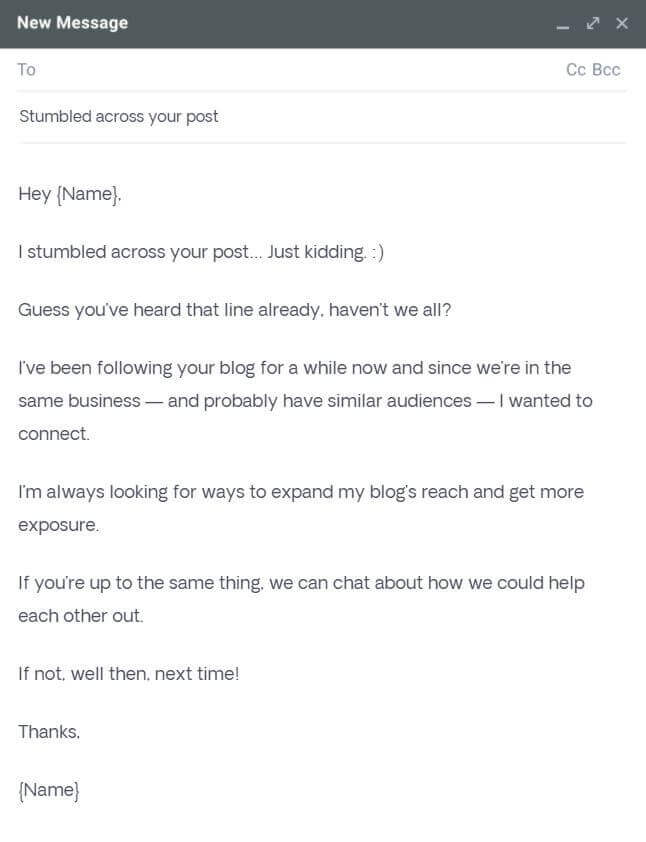Google’s First Page Ranking Guaranteed in 9 Easy Steps (Beginner’s Guide)
Google is the all-powerful for those in the industry of driving organic traffic. It crawls the internet to find the most valuable and relevant pages for its consumers on nearly any topic. We don’t only trust, but we rely on Google’s results. With so much power and influence, putting your small business on Google’s first page may seem impossible.
However, Google’s great strength makes it easier than ever for small and local businesses to rank high in search results—for free! In this essay, I’ll go through a few concrete steps you can do to assist your company get to the top of the first page of Google utilising two free strategies: website optimization and listing optimization. I’ll start with the importance of Google’s first page, then go on to the techniques, which include:
9 Ways to Get Your Website on the First Page of Google
It is abundantly evident that being on the top page of Google is an useful (if not vital) aim for any organisation, but before we get into that, let’s first go through the specific benefits of doing so, as this can help you prioritise within the strategy of your firm.
Why the first page of Google is important
Wasteland refers to everything that isn’t on the first page of a Google search. To put it another way, that’s putting it nicely. Seventy-five percent of people using search engines will never click on results that are on the second page. They are not even mentioned on the second page of the report. The fact that the result that appears in the first position on Google receives around 32 percent of all clicks is even more telling about the strength of the first page. That’s a very sweet spot you find yourself in right there. Even the second position receives approximately 25 percent of all clicks, while the sixth place receives slightly more than 6 percent of all clicks. If your website is on the second page of the search results, the highest click-through rate (CTR) you may hope to get is approximately 0.78 percent.
Nearly 91 percent of the billions of web pages indexed by Google receive no traffic from the search engine. Ouch! Those figures are self-evident. If you don’t appear on the first page of Google, your potential clients are unlikely to find you. We SEOs have a joke that goes something like this: “Where do you conceal something you don’t want people to find?” What is the solution? “It’s on Google’s second page.” The lower you appear in the search engine results, the better. The lower your position on the page, whether it’s page two or page ten, the less likely you are to increase visitors and sales.
You should also be aware that your competitors are already ranking on Google. Go ahead and search for one of your keywords in Google to see who comes up. The longer you wait to establish an SEO plan, the harder it will be to achieve those coveted top rankings. And making up for that lost time isn’t simple. The good news is that getting to the first page doesn’t require a large marketing budget. When you arrive, you’ll understand why everyone is so excited.
For those who are new to the world of SEO or are struggling to make their mark, seeking guidance from seasoned professionals can be a game-changer. For instance, Kunal Dabi, a renowned SEO expert in India, has consistently demonstrated the ability to rank websites on Google’s first page. Leveraging such expertise can significantly enhance your chances of achieving that coveted top spot.
How does first-page ranking benefit your business?
You’ve undoubtedly figured out by now that a first-page ranking is beneficial to your business based on the information I’ve provided. It’s not only about higher click-through rates. It’s all about the advantages that higher click-through rates provide. Not to mention some of the other fantastic things that can happen when you rank first. What do you mean, exactly? Let me give you a quick synopsis of what’s going on.
More visibility
Isn’t this a no-brainer? If you appear on the first page of Google for specific keywords, you will be more visible to individuals who are looking for that information. Improved exposure has a fantastic knock-on effect: the more people see your brand and website in the search results (remember, the vast majority of them don’t even click through to the second page), the more aware they are of it.
Better engagement, traffic and leads
You will get nothing if you are buried on page two – or worse! – of the search engine results. In light of the statistics, what you will receive is practically as meaningless as nothing. However, everything changes on the first page. When you rank top for terms with high buyer intent, you can expect to see a spike in engagement. Your organic traffic will grow, and more leads will come through your virtual doors.
Getting to the first page of the search engines is crucial. A search engine is the starting point for 68 percent of online experiences. In addition, a relevant search influences 39% of shoppers. For answers, people turn to Google. When they’re looking for something, they go to Google. You have a better chance of being found if you are on the first page of the SERPs for your keywords. And that’s when everything starts to fall into place.
In the early days of SEO, you could create spammy material that was filled with keywords and yet rank top. However, Google has updated its algorithm over time so that the ranking variables now take into account the quality of a website’s content. Google users are aware of this. They understand that if they search for something on Google, the top SERP will most likely provide them with the information they require.
That is why so few of them search beyond the first page of results. That means improved industry authority and the chance to develop trust with internet visitors before they even click through to your website for firms that rank on the first page. They understand that Google has worked hard to eliminate spam and low-quality pages.
First-Page Google Search Rankings: An Introduction
If you want your content to appear on the first page of Google, read this article completely. Rank any certain key word on the first page of Google. We’ll show you how to rank a specific keyword on Google’s first page quickly and effortlessly in this How to Rank on the First Page of Google Search Pageguide. In today’s high-stakes market, it’s critical to rank as high as possible in search results, which entails doing a good job. Getting that website to the first page of Google’s search results.
Because of this, many bloggers quit working on their own site after a while that their posts don’t rank at Google and their sites don’t get visitors. Google is your all-powerful search engine. It crawls the Internet, Determining which pages are the most useful and applicable for the customers for just about any topic. We do not only trust Google’s results we answer them to make decisions during the day for every single element of our lives. Determine Your Precise Keywords First, decide which search questions you need Google to reply with Your site pages. These are called keywords -which, incidentally, may be single words OR phrases.
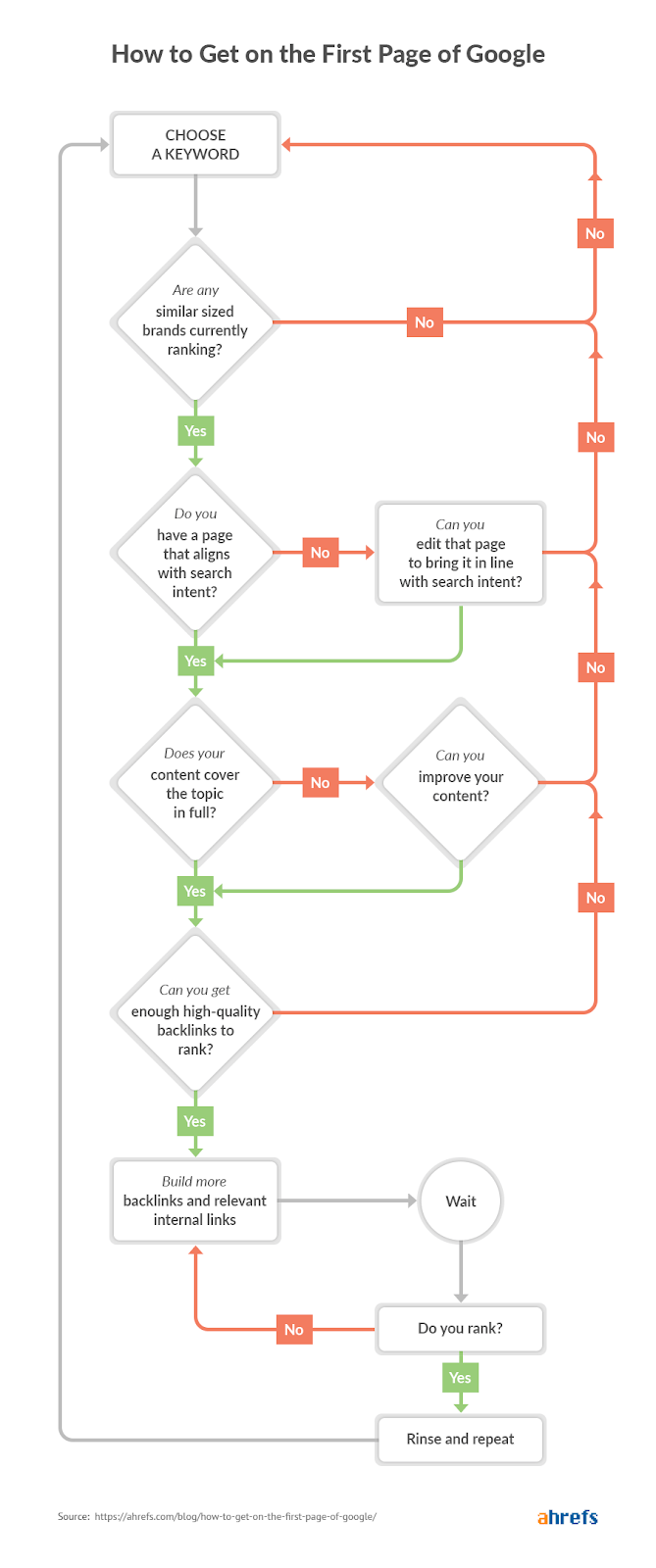
Examples of keywords include:
“How to run Pubg on PC” “Best Hollywood movie” “WordPress helpful or not” “the best way to get on the very first page of Google” “How to Rank some Particular Key Word on Google initial Page” Each article on your own site should aim a different pair of keywords so the article is not competing with one another. The ideal keywords for your sites are those your perfect visitors are looking in to receive the info that they require. Inform Google Search Engine Your Own Particular Keywords Google works by crawling the Internet, inventorying the countless Posts which exist, and keeping them in an indicator. When a person performs a search, Google can scan through its organized index to rapidly-produce relevant outcomes.
Hence, another significant thing for establishing on the first page of Google would be to make it as simple as possible for Google to scan, index, and retrieve your website. Start Title tags along with your Specific Keyword You post Might Be up on the Google search results page with The right keyword, channelling a large number of visitors to your site. The name of this report defines its own content, and therefore, a keyword-rich title holds better fat with Google. You may observe that inaction by looking for the aggressive keyword in Google. As you can see, many pages that rank for competitive keywords strategically put them in the commencement of their name tags.
Though not compulsory, it is wise to do this since it will make your website more relevant to what people seek out. The Perfect place to Begin placing keywords in a Guide is inside the You will find many to whom those come naturally, but a high number of bloggers would rather have a long intro before bothering using a keyword. This is inadvisable due to the apparent reasons that Google would not find it quite important from the search results. Put Your Particular keyword from the URL As keywords are basically the backbone of search-engine SEO, you Want to Pay a great deal of focus on them. There’s absolutely no reason to not include them on your URLs. The addition has its own benefits. If you assimilate the targeted keywords to the URL, you’re ensuring that Google has yet another motive and way to think about your post as more applicable for a specific phrase. Post Extended Content Studies show that longer content aids improve rank on Google. A goal of about 1500 words must be put in each article using a minimum of 600 words at the least.
This would inevitably lead to long-tail traffic that would boost your website’s exposure. Longer content not only assists in adding more keywords for this but there’s also a natural focus on advice. The validity of a post raises with more text, meaning Google would recognize it as something more applicable than a briefer and succinct text. As lookup patterns are interchangeable with extended tail keywords today, a lengthier text also boosts the odds of your article/website being in a higher position than others. Whilst composing a post in which you need to grab people’s attention, you need to remember to study well before writing the first sentence. Be certain that all of the appropriate information is offered to you until you begin.
The fantastic study ends in flair, which causes long and in-depth writing. Outbound links are the Principal source of attracting more focus to Your own site. There is a good deal of individuals that make the mistake of not adding links to additional websites/articles. Outbound links show Google the guide is equally legitimate and enlightening and both are critical requisites for rank. Thus, be certain if you’re not doing this, add links to every one of your posts. Just ensure the links are applicable to your articles and out of authentic and high-quality sources. Internal linking is Essential to decreasing a Site’s bounce speed and optimization since it connects to the various pages of a domain collectively. When connection juice is dispersed, the users/viewers remain on the site longer and the website traffic also increases. It boosts the navigational experience for your consumer and of course it will also lead to diminishing the bounce speed of your site. Bounce speed is measured by the number of users who see just 1 page and leave the entry page. Easy and accessible internal linking will obviously reduce such as users will be led to additional relevant posts.
Additionally, Google bots are intended to emulate user behaviour routines and assess your site. A wise and effective network of hyperlinks on the webpages help crawlers find areas that aren’t frequently seen by the consumers, thereby boosting your site’s rank. The Advantages of Client blogging are apparent:- You property backlinks from Authority websites. Targeted referral traffic flooding to your Website. People appear to you as a professional. (Id ). Locating blogs to the guest articles through Google search Engine: Compose us”your subject.” Your keyword +”guest article ” Assessing your goal bloggers is Vital Whenever you need to distinguish the winners from the losers and cosy up to them by engaging them Twitter/Facebook or through mails. Find a great and Proper subject to compose a Guest article about. By way of instance, a meat-related article on a vegetarian blog website will get rejected so it is important to understand what it is you are managing. Have a fantastic pitch prepared to convince bloggers to let you compose to your guest article for them.
The last step would be to follow up on all comments immediately and comprehensively. Backlinks Out Of Blog Commenting Commenting on sites help to make Backlinks, which in turn produce Traffic to your site. The majority of these connections are useless and consequently carry little worth, but the procedure is still beneficial. For new sites, remarks user-generated content will help capture a rank any particular keyword on Google’s first page indexed quicker. Commenting helps induce referral visitors to your site. But, it’s crucial to post a valuable remark. RegularCommenting is the very best method to connect to any blogger. When it can take some opportunity to make those links, you’ll be detected by the website’s administrator along with other co-bloggers that may be rewarding in the long term. At this time everybody uses social websites and with the support of the Social websites you need to attract visitors to your website in order for your website to rank well. Promoting your sites is very important to let folks know of its presence and to enhance visitors.
Although Google does not hold much stock in societal websites as far as Standing is concerned, it’s possible to really enhance your website’s traffic and popularity by being busy on Facebook, Instagram, YouTube, or even Twitter. The longer you post links to your sites on social networks, the greater the opportunity people will drop by your website, thus increasing visitors. Do not deceive Your customers. Avoid tricks meant to improve search engine positions. A fantastic guideline is if you’d feel comfortable explaining what you’ve done to a website that competes with you personally, or into some Google employee. Can I really do This if search engines did not exist?” Consider what makes your site unique, engaging, or valuable.
Make your website stick out from other people in your area.” These tips are equally complete as Google is the most popular and Successful search engine on the market. Despite the fact that you utilize its services, it is only wise to stick to the instructions to the letter. Google updates its search algorithm regularly. As an example, Google recently introduced its core upgrade, where many bloggers advised that their website has been down and the posts that they were standing have gone down in case you also want the post to be down if Google core upgrade comes. Such changes have to be known to plan a plan regarding website rank.
How one can use what you are promoting listings to get on the primary web page of Google
Along with your web site pages, your on-line enterprise listing listings can even present up on the primary web page of a Google search. Right here’s what it is advisable to do:
Create a Google My Business account
Google My Business is evolving into one of the vital highly effective (to not point out free) instruments for native enterprise homeowners. Each Google Maps and Search pull from Google My Enterprise to provide native listings (often known as Enterprise Profiles). Creating a Google My Business account is a quick and simple means so as to add extra information to your Enterprise Profile, which helps it to look on the primary web page of Google Maps and Search (within the local outcomes part)h. Ensure you observe by way of with claiming and verifying your itemizing so as to monitor, keep, and optimize your itemizing.

Optimize your Google enterprise listing (Business Profile)
Talking of optimizing your itemizing, I think about this technique a separate entity as a result of whereas making a Google itemizing can assist you along with your visibility, it might probably solely take you to date by way of rating. Somewhat than making a bare-bones itemizing and hoping that it reveals up for one or two searches, optimize your Google business listing for max visibility. Right here’s how:
Full every part of your profile
The extra information you embody in your Google My Enterprise itemizing, the extra searches for which it might probably present up on the primary web page. In reality, full Google My Enterprise listings get, on common, 7X extra clicks than incomplete listings. Maintain your title constant Use the identical precise title for what you are promoting always. Google doesn’t like discrepancies—even these as minor as “Co.” vs “Company”
Replace your information
Not being able to find your business, seeing it closed when you arrive, or encountering problems like getting no response when you call, can discourage customers. It might even make them not trust your business or write a negative review. To avoid this, it’s important to keep your Google business listing accurate and updated. This way, customers can trust the information and your business can appear at the top of search results. Getting reviews on Google is also essential. People who search on Google like to know what others think about a business. Businesses with more positive reviews usually show up on the first page of results. You can ask customers face-to-face and create an easy link for them to leave reviews on Google. This will help you get more reviews on your online platforms.
Checklist what you are promoting on different directories
Google My Enterprise is highly effective, however, it’s best to nonetheless create and optimize listings on different widespread directories like Yelp. First, as a result of Yelp has high visitors and is broadly trusted by Google, so what you are promoting’s Yelp web page can very well present up on the primary web page of Google for related searches. Second, as a result of a strong itemizing with optimistic evaluations improves your on-line presence generally.
Online reviews and hyperlinks from different trusted websites ship indicators to Google that determine its ranking algorithm. As along with your Google Enterprise Profile, ensure the remainder of your online listing listings are full and correct, constant throughout platforms, up to date, and that you’re gathering and responding to evaluations. Don’t neglect so as to add pictures to your online listings as well.
Getting on the first page means significantly higher click-through rate
Although it’s common knowledge that Google’s first page attracts the majority of traffic, did you realise that the click-through rates for the top vs. bottom results varies significantly? According to one study, the following click-through rates vary depending on Google position: • The first result had a clickthrough rate of 36.4 percent; the second had a clickthrough rate of 12.5 percent; and the third had a clickthrough rate of 9.5 percent.
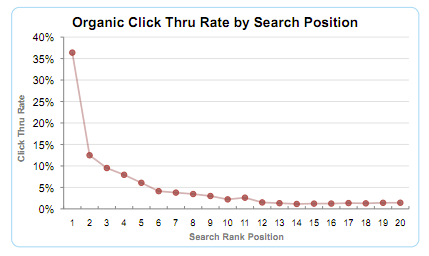
The CTR for the 10th result has dropped to 2.2 percent (there are generally only 10 organic results per page, and even fewer now with local results, advertisements, answer boxes, and other new features). You’re missing out on a lot of clicks if your website isn’t at the top of Google’s search results.
Get immediate exposure
Top Google search results are now displayed in “Position Zero” answer boxes, often known as highlighted snippets:
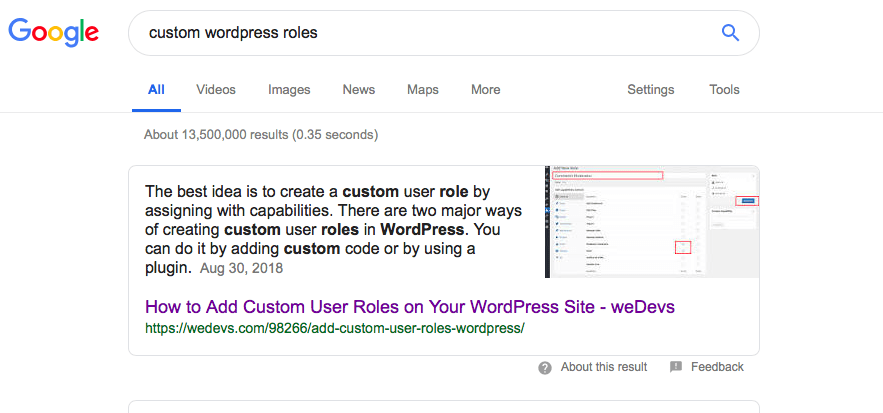
How many alternative methods are you able to get on the primary web page of Google at no cost?
Getting on the primary web page of Google just isn’t only a typical objective amongst small enterprise house owners, but additionally a really possible one. Google just isn’t centered on amount, however high quality. As a outcome, a bigger company or larger budget doesn’t equate to top rank. There are a number of factors behind Google’s algorithm and, due to the truth that Google’s results page has many alternative parts, there are additionally several types of media that may obtain first-page standing.
They embrace:
• Blog posts and web site pages (in natural outcomes)
• Your Google My Business account (within the native/maps part)

Optimizing your Google My Business itemizing ensures your online business and its rankings present up for native queries.
• Snippets of your web site content material (in Google’s many search outcomes web page features together with “People also ask” and the reply field.
• Your landing pages (This is through the paid advertisements part, which isn’t free, however nonetheless value mentioning. For extra assist with utilizing paid methods to get on the primary web page of Google, head to this post on Google Ads tutorials.) Now let’s get again to the 2 free mediums by which you may get to the primary web page.
Write for humans
Of course, the most crucial location to incorporate the keywords you’re seeking to rank for is in the body of your page’s content. It is critical, however, that these keywords are not added methodically or excessively, but rather organically. In reality, Google can now detect term stuffing, and if it does, you’ll be relegated to the second page of its search results.
The secret to ranking on Google’s first page is to provide valuable, trustworthy, easy-to-read, yet educational content that keeps your target audience on your pages and returning for more. It’s also free and simple to share the knowledge you already have in your head in a conversation. Just keep in mind that if you want to rank on Google’s first page for a specific term, your page must deliver the content, not just the keywords, that visitors are looking for when they input that search into Google.
Emphasize location
Targeting location-based inquiries is another free technique to get your website pages on Google’s first page. Make sure your website’s contact page, as well as possible blog entries and services pages, explicitly state your city and/or geographic location. When users search for “your industry” + “your city,” Google will pick up on this information and display your firm as a “near me” search result.

Optimize for mobile
You will not find a responsive website at the top of a Google search. Phones and tablets are being used by consumers more than PCs and laptops, and mobile devices are used for the bulk of local searches. As a result, Google promotes websites that are mobile-friendly. In reality, mobile-first indexing is now used to index all websites. Responsive design is good since it adapts to any screen size while maintaining functionality. If you don’t have a responsive website, there are several changes you can make to ensure that a mobile user has the best experience possible.
How to use your business listings to get on the first page of Google
In addition to your website pages, your online business directory listings can also show up on the first page of a Google search. Here’s what you need to do:
Create a Google My Business account
Google My Company is quickly becoming one of the most powerful (and free) tools available to local business owners. Google Maps and Google Search both use Google My Business to generate local listings (known as Business Profiles). Adding extra information to your Business Profile through a Google My Business account is a quick and easy approach to make it appear on the first page of Google Maps and Search (in the local results section)h. Make sure you complete the process of claiming and validating your listing so you can keep track of it and enhance it.
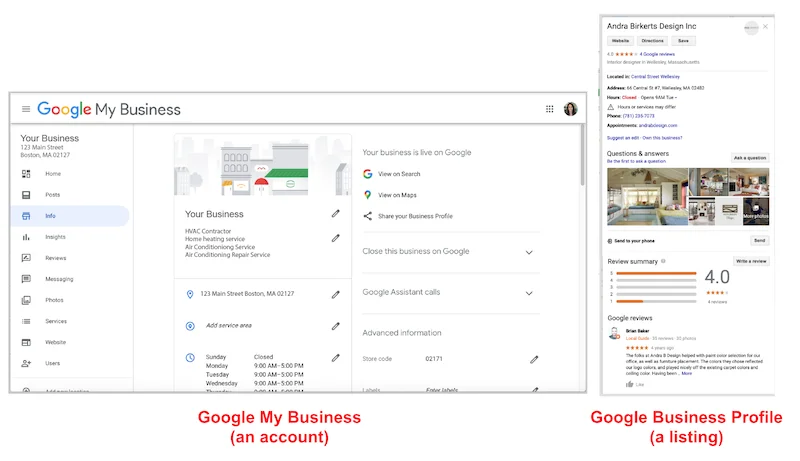
Boost the visibility of your Google Business Profile
When it comes to optimising your listing, I think of it as a different strategy since, while having a Google listing can help with visibility, it can only go you so far in terms of ranking. Optimize your Google business listing for optimal visibility rather of producing a bare-bones listing and hoping it shows up for one or two searches. Here’s how to do it:
Make sure you fill out every element of your profile.
The more information you give in your Google My Business directory, the more likely it is to appear on the first page of search results. Complete Google My Business listings receive 7X more clicks on average than incomplete listings. Keep your name the same. At all times, use the same exact name for your company. Google isn’t fond of inconsistencies, even if they’re as tiny as “Co.” vs. “Company.”
Keep your information up to date.
Not being able to find your business, arriving to find it closed, or receiving an operator when calling can not only put a customer off, but also cause them to distrust your company and leave a negative review. Keep an eye on your Google listing and make any necessary edits or modifications so that it can be trusted to be at the top.
Add images to your listing.
Google My Business aims to provide customers with as much information about a company as possible before they interact with it. This includes what it’s like to work there, so make sure to include images of not only the items and services your company provides, but also the ambiance and people who frequent it. Use our Google My Business Grader to see how well your business is doing. We offer a free tool that is tailored to Google My Business listings. Simply log up with your Google business account and, in less than 30 seconds, you’ll receive a profile evaluation and understand what you need to do to move closer to the first page.
Obtain customer reviews
Google users are eager to learn what others have to say about a company, so it’s no wonder that firms with the most positive Google reviews appear first. Customers should be asked in person, and a review shortcut link should be created so that you can simply encourage feedback throughout your internet channels. While this technically falls under the category of Google My Business improvements, keep in mind that there are a slew of additional review sites to consider, each of which has an impact on your ranking.
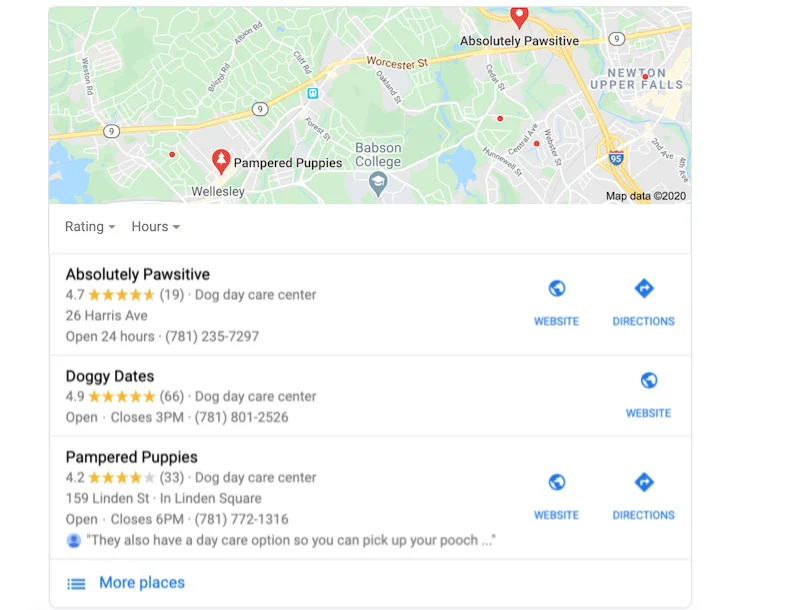
List your business on other directories
Although Google My Business is effective, you should also develop and optimise listings on other prominent directories such as Yelp. For starters, because Yelp has a significant volume of traffic and is well trusted by Google, your company’s Yelp page is likely to appear on the first page of Google for related searches. Second, having a quality listing with positive evaluations boosts your overall web presence.
Google receives signals from online reviews and links from other reputable websites, which are factored into its ranking algorithm. Make sure the rest of your online directory entries are thorough and correct, consistent across platforms, updated, and that you are gathering and responding to reviews, much like your Google Business Profile. Remember to include images in your online listings as well.
Check Your Competitors
Even if you’ve done everything you can to get on the top page, you can still have problems because most of your competitors have a large following and are already trusted by Google. Even if you’re competing with major names like Nordstrom and Macy’s (for online clothing sales), you might consider yourself lucky if your website appears on the third page of the search results.
If you want to be on the top page, though, being on the second page isn’t good enough. However, compared to winning a slot on the third or fourth page, you only need to put in a little more work to get to the top page. You need to know who you’re fighting against in order to locate a suitable strategy for getting your website onto Google’s top page. To begin, type your keyword into the search field and scroll down to the first page of results.
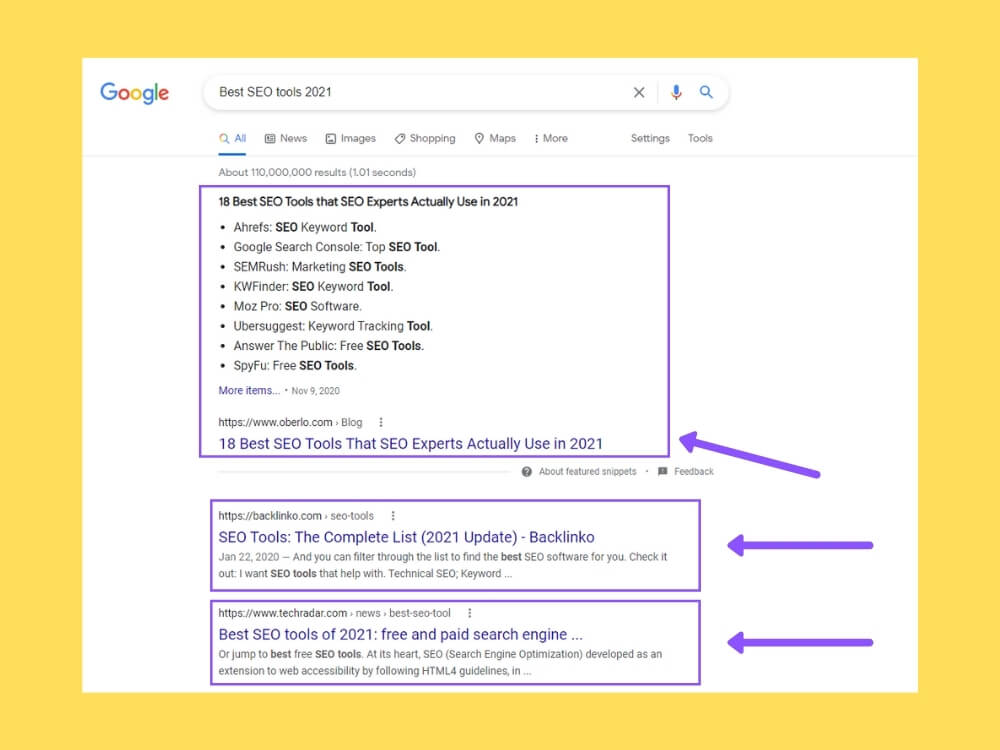
If you observe major brand names of well-known organisations on Google’s first and second pages but your website has no ranks or traffic, you should adjust your strategy or keywords to target. When looking out the keywords that your competitors are using and determining the most appropriate keywords to target to get an advantage, you may use competitive keyword analysis. When you know the terms that your competitors are using in their organic and paid search campaigns, you may be able to improve your ranking.
Find keywords that your competitors haven’t yet discovered and start targeting them. – Find out why your competitor’s website ranks higher for the same keywords you are targeting. – Find out what long-tail keywords your potential customers are using that you didn’t think about. – Take note of the keywords that your competitors are targeting and use them more effectively to outperform them.
Create a Page that Supports Search Intent
Remember, the first page of Google has individual web pages, not entire websites. Imagine you have a page about “fixing faucets” and another about “finding plumbers.” Both could be on Google’s first page. Even different pages from your site might show up on different search pages. You can make any page rank, not just the main one. Your site’s reputation affects how well each page ranks.
To rank well, make sure your page fits Google’s ranking criteria for your chosen keyword. If it matches what people look for, you’ll rank better. You’ll find landing pages, product pages, and blog posts in search results. Don’t change the page’s URL, or you might lose important links.
You can use these content formats:
- Lists
- Tutorials
- How-to guides
- Comparisons
- Reviews
- Opinions
For recipes, use how-to guides. Tutorials are good for DIY projects. Choose the right format for your topic. Make sure your content suits your audience. If you’re targeting new bloggers, offer blogging advice. Show your expertise and go into detail. Write helpful stuff people need. Your page could end up on Google’s first page.
Include Internal Links and Build Quality Backlinks
Backlinks are significant since they can increase the authority of a page. When comparing high-authority and low-authority pages, higher-authority sites tend to rank higher. If your page has a lot of high-quality backlinks, it means that it contains important information that people should read. Many top-ranking websites have accumulated thousands (and counting) of backlinks over time. Another strategy to increase the authority of your page is to provide relevant internal links. So, what’s the best way to generate backlinks to your website? Without getting into too much detail, one of the most effective strategies to get backlinks is to find comparable websites and email them, eventually asking them to link to an article on your site.
Here is a great example from Respona:
The links that point to your site, also known as backlinks, notify Google that other websites trust your site’s authority and perceive it as trustworthy. It’s crucial to remember that backlinks from similarly respected sites are the ones that can assist your page rank higher. They must not be harmful or spammy links. As previously said, it is critical to maintain the structure of your URL and never change it. If you have to change some of your URLs, don’t forget to redirect the old ones to the new ones.
Aim for Featured Snippets
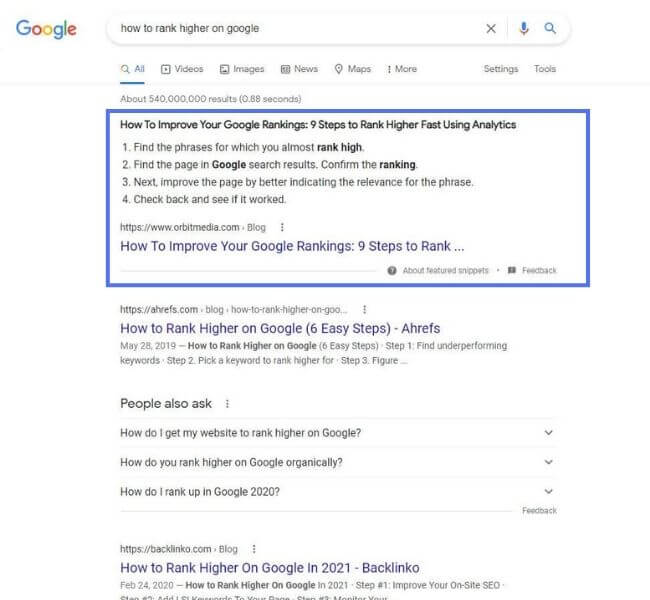
You might have seen those short answers that show up above Google search results. These are called featured snippets, and they’re even better than being on the first page. They give quick answers to people’s questions. Featured snippets can help your site show up on the first page. But you can’t pick the snippet—Google does that. There’s no magic code to guarantee it. You can’t be sure you’ll get picked.
Still, you can tweak your content for a better shot:
- Use short, clear bullet points for step-by-step things. Put them near the top.
- If you’re making a list, use bullets up high.
- Featured snippets often answer “how,” “why,” “where,” “when,” “what,” and “who” questions. Make content that answers those. You could even tackle related questions to show you’re an expert.
It’s about making your content easy to grab for Google’s snippets.
Meta tags are short sentences that appear in Google search results to provide users a quick overview of the material. The meta tags are similar to featured snippets, however they are a little shorter. Your meta tags can only have a maximum length of 120 characters. To entice your visitors or consumers, be sure to provide the most relevant material as well as your keyword.
Although the meta tags do not appear on your website, you can choose succinct, precise phrasing for each web page. You must develop labels that persuade users to click on your link. When it comes to adding your keyword in your meta tags, you must also be imaginative. Check out this post from Search Engine Watch to discover more about how to properly set up your meta tags so that your website ranks on the first page of Google.
Optimize Your Web Page for Mobile
People are increasingly using their mobile devices to do online transactions. Mobile devices account for half of all internet traffic. When visiting a website, no one likes to encounter a broken page or an odd web page layout. You should make sure that your website and web pages are mobile-friendly and optimised. If your website is not responsive or mobile-friendly, all of your efforts will be for naught. You may need to employ a respected agency to assist you establish a mobile-friendly page if you are not a web design and development specialist.
With WP Engine, you may get one of the best hosting services in the world for your website. With the coupon code WOOYEAR22, you may save 20% on your first payment. Hurry, the offer expires on February 28, 2022.
You might think of it as a sound investment that will pay out for years to come. You may also need to employ a professional to maintain your site to ensure that it runs properly and provides an excellent user experience at all times. If your users aren’t having a good time on your site, don’t expect them to stick around.
Create web optimization optimized content material
Now that you’ve found out what key phrases to focus on and how much content material to create for them, it’s time to really create it. Most possible it’s both of these two – A weblog post or a Product/service web page and for each of those content material varieties, the identical web optimization optimization guidelines apply.
Keyword-rich URL
Your URL should all the time be the principle key phrase you might be concentrating on and should not be too long. For instance, the key phrase I’m concentrating on is “Google first page guaranteed” due to this fact URL appears to be like like attentionalways.com/google-first-page-guaranteed/, many individuals use your entire title within the URL. That makes the URL too long so I counsel you don’t try this.
Main key phrases within the title
Your primary key phrases should be within the title of your web page/post. Since Google treats synonyms equally, you will get away with utilizing synonyms within the title however having one thing completely unrelated is a foul web optimization apply.
Add modifiers to the title
Modifiers like Best, top, most cost-effective, (present 12 months), and so forth within the title enable you to get extra visitors without extra effort. Many individuals add modifiers like these to your primary key phrase whereas looking out on-line. This shouldn’t be utterly vital so as to add modifiers however it’s a good and fast strategy to get extra visitors.
Wrap title in H1
Although WordPress wraps the title within the H1 tag, by default many themes overwrite this. Check if that is so along with your web site, and proper it.
Use multimedia like Images and movies
Using photographs and movies in your posts not only makes it look higher but in addition will increase the time a consumer spends in your web site which is good for web optimization.
Subheading within the H2 tag
All your subheadings should be within the H2 tag.
Link out to exterior resources
Linking out to related exterior resources helps google decide the subject of your personal web page higher and improves consumer expertise as well.
Image alt textual content
All the pictures you employ should have an alt tag. Don’t go away it clean.
Long content material (Google loves it)
Lately, Google has been preferring Longer content material over shorter content material. Aim for 1500 phrases on a web page no less than. And to go one step forward, create content based on briefs from Content Harmony which reveals precisely which matters to incorporate in your content material to rank higher.
Track its Google ranking and traffic
Now it’s time to track how your pages are doing in search results for the keywords you’re aiming for. This helps you see how your efforts to build links, improve content, speed up your site, and make other changes are working. Your pages might go up in rank or stay the same as you work on these things. This shows you what’s helping your SEO the most.
By keeping an eye on how your rankings change, you can focus on what’s working. If something boosts your ranking, do more of it. If something doesn’t help or makes things worse, you can stop doing it. You can use a tool like Serptoday’s free plan to track your rankings. This tool is especially good for new bloggers who don’t have a lot of money to spend.
Summary
Here’s a summary of the strategies to get on the first page of Google:
- Keyword Strategy: Figure out the words your customers search for and plan your content around those keywords.
- Content and Tags: Use these keywords in your website content and HTML tags to show Google what your pages are about.
- Write for People: Make sure your content is helpful and readable for your visitors, not just for search engines.
- Local Searches: If your business serves a specific area, focus on keywords related to that location.
- Mobile Optimization: Ensure your website works well on mobile devices, as Google values mobile-friendly sites.
- User Experience: Make your website easy to use and navigate, providing a good experience for visitors.
- Google My Business: Create an account and fill out your profile accurately for local visibility.
- Profile Optimization: Make sure your Google My Business profile is complete and engaging for potential customers.
- Customer Reviews: Encourage happy customers to leave reviews on Google, as positive reviews can boost your credibility.
- Directories Listing: List your business on online directories to increase its online presence.
Remember, achieving a good Google ranking takes effort and time, but with the right strategies, even small businesses can improve their visibility and attract more customers.
F.A.Q
Q1. How do I appear on the first page of Google?
A. To get on Google’s first page, use these SEO strategies:
- Target specific keywords.
- Create high-quality content.
- Consistently produce content.
- Participate in expert roundups.
- Focus on local SEO tactics.
Q2. How much does it cost to get on the first page of Google?
A. Organic methods are free in terms of money, but demand time and effort. Paid search ads can provide faster results but involve a cost.
Q3. How can I get on the first page of Google in 24 hours?
A. Achieving first-page ranking in 24 hours is unlikely through organic methods. Consistent application of the mentioned strategies can gradually help you get there.
Q4. How can you get to the top of Google search results?
A. By selecting relevant keywords, creating valuable content, and investing time and effort, you can climb the search rankings. Focus on user intent and useful information.
Q5. What percentage of Google searches go past the first page?
A. Around 75% of users don’t navigate beyond Google’s first page. Ranking there is crucial for visibility.
Q6. How to get on the first page of Google for free?
A. Utilize the SEO strategies mentioned. They require effort but not money. Google ads are an alternative if you choose to invest.
Q7. How can I rank on Google?
A. Optimize your content for relevant keywords, enhance website design, create quality content, and build backlinks to improve your search rankings.
Q8. How long does it take for Google to rank your web page?
A. Rankings can change in a short time or take a while. Consistent and dedicated use of the strategies mentioned can enhance your chances over time.
Originally posted 2022-07-17 23:42:31.
